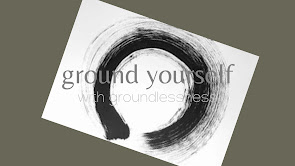Ground Yourself with Groundlessness
Grounding oneself in groundlessness comes from
the idea that there is never-ending chaos surrounding us and we have to find
our place in it. To ground, essentially, is to make peace with and to settle
into the space that you are in at any given time. It is necessarily a form of
radical acceptance of the moment you are in and the ground, earth, and
circumstances you have been given. Meanwhile, it allows us to be free-acting
agents in our current situation by altering the element of bodily or mental
discomfort that comes with feelings of dissociation or issues with similar
features.
I love to actively engage in my own grounding: in my writing and in my everyday life. Every single time I write is an opportunity to embrace groundlessness and work with it to enjoy the process. My favorite practice of this theory involves a fuzzy rug, a cup of tea, and a notepad. The premise is that sensation-based awareness brings a keener ability to write through embodiment in our practice.
What I do is use
the fuzzy rug to help me ‘feel my feet on the ground’ and really immerse myself
in the sensation. At the same time, I take a sip of tea when I feel my mind
wandering, and note down anything relevant to the experience that came up for
me on the notepad. Through using embodied practice to be attentive to the
writing moment, I most always feel an astoundingly strong awareness and focus
on my project.
My model for approaching virtually
every aspect of my life is with attentiveness to self-compassion. This is
especially pertinent with embodied experiences such as writing. Despite those
who contest this; writing is embodied.
Not only can I state the obvious – that the brain is, in fact, located in the
body – but the brain is also interconnected with embodied experience through
the parasympathetic nervous system (PNS) which interacts with one’s environment
to ameliorate the apparent disconnect between brain and body. This means that
we have visceral reactions to our writing, and so, self-compassion – it seems
to me – is the only key that fits the lock to our ability to write. We simply
have to unlock it.
Unlocking the door to our writing through self-compassion helps us divorce ourselves from audience, from product. When we put audience and product before our own experience of writing, we prioritize perfection over self-compassion. Perfection is a myth predicated on the capitalist and oppressive idea that one must finish a work, and be productive at all times, and do their best, and always be working on something new, etc., as well as balancing all other aspects of life, rather than simply working towards something greater than themselves in their writing.
With self-compassion comes grounding as a tool for investigating one’s embodied experience and relationship to self, mental experience of the world, and writing experience. Connection to the environment, between the body and the brain, to the collective or community, allows us to not only practice self-compassion, but to embody it.
With the ‘feet on the ground’ approach, we can begin to paint a picture
of how connection –- even to the earth itself, as embodied through our feet
pressing into it and grounding us there – creates greater affinity for self and others, making embodiment a
motivating factor, and thus, allowing one to enact self-compassion in embodied
practices.

No comments:
Post a Comment